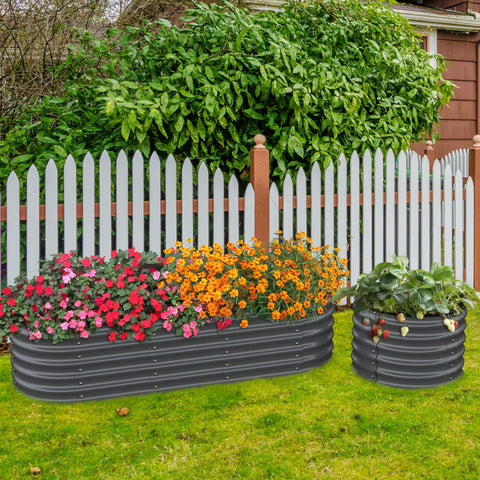A Green Thumb's Paradise: Tips from Olle Raised Bed Garden Success
Gardening is a delightful and rewarding hobby, offering a connection to nature, fresh produce, and a sense of accomplishment. If you're looking to maximize your gardening experience, raised beds might be the answer. Raised bed gardens are an excellent choice for both beginners and seasoned gardeners alike. In this blog, we'll delve into the world of raised bed gardening and provide you with valuable tips for creating your own green thumb's paradise.
What Are Raised Bed Gardens?
Raised bed gardens are planting areas that are elevated above ground level. They consist of framed beds filled with soil that is raised higher than the surrounding ground. These structures offer numerous advantages for gardeners, making them increasingly popular in backyards and community gardens. Here are some key benefits of raised bed gardening:
Improved Drainage: Raised beds allow excess water to drain away more effectively than traditional gardens, preventing waterlogged roots and soil.
Better Soil Control: You have complete control over the soil composition in raised beds, which means you can create the ideal growing environment for your plants.
Reduced Weeding: The contained space of raised beds makes it easier to spot and remove weeds, reducing the time and effort required for maintenance.
Extended Growing Season: Raised beds warm up faster in the spring, enabling earlier planting and extending the growing season in colder climates.
Accessibility: Because they're elevated, raised beds are easier on the back and knees, making gardening more accessible for people of all ages.

Now that we understand the benefits let's explore some essential tips for success in your raised bed garden:
- Location Matters:
Choose a sunny spot for your raised bed garden. Most vegetables and flowers require at least 6-8 hours of direct sunlight each day. Ensure that your raised beds receive ample sunlight for optimal plant growth.
- Quality Soil is Key:
Your raised bed garden's success is primarily reliant on the soil's quality. Invest in a high-quality mix of garden soil, compost, and organic matter to provide your plants with the nutrients they need. Regularly amend the soil to maintain its fertility.
- Proper Bed Dimensions:
The dimensions of your raised bed matter. Make sure they're wide enough to comfortably reach across without stepping into the bed (typically 3-4 feet wide) and no longer than 8-12 feet to ensure easy access and maintenance.
- Adequate Drainage:
To prevent waterlogging, ensure your raised beds have proper drainage. You can add a layer of gravel or use well-draining soil mix. Additionally, consider adding drainage pipes if needed.
- Planting Wisely:
When planning your raised bed garden, consider companion planting. Some plants grow better when placed near specific companions, while others inhibit each other's growth. Research companion planting for your chosen crops to maximize your yield.

- Mulch for Moisture and Weed Control:
Applying mulch around your plants helps retain moisture, reduces weed growth, and regulates soil temperature. Organic mulches like straw or wood chips work well in raised beds.
- Regular Maintenance:
Just like any garden, raised bed gardens require maintenance. Water your plants consistently, prune when necessary, and keep an eye out for pests and diseases. The raised bed's contained environment makes it easier to manage these issues.
- Rotate Crops:
To prevent soil depletion and reduce the risk of pests and diseases, practice crop rotation. Don't plant the same type of crops in the same spot year after year.
- Keep a Garden Journal:
Maintain a journal to track planting dates, crop varieties, and any issues you encounter. This record-keeping will help you learn from your experiences and plan better in the future.
- Enjoy the Process:
Lastly, remember that gardening is a journey. Don't be discouraged by occasional setbacks or failures. Every season brings new opportunities to learn and improve your skills.
Creating a raised bed garden is an excellent way to transform your backyard into a green thumb's paradise. With careful planning, good soil management, and a little TLC, you can enjoy a bountiful harvest and the satisfaction of nurturing your own piece of nature. So, roll up your sleeves, pick up your gardening tools, and let your raised bed garden flourish! Happy gardening!
